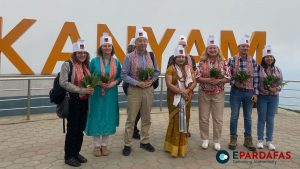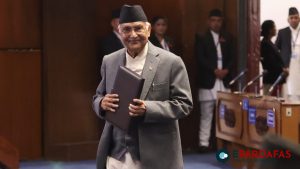
Prime Minister KP Sharma Oli Advocates for ‘Mountain to Sea’ Initiative to Combat Climate Change at the UNGA
In a powerful call for global climate action, Prime Minister KP Sharma Oli of Nepal advocated for the adoption of a comprehensive ‘Mountain to Sea’ initiative during his address at the High-Level Plenary Meeting of the 79th United Nations General Assembly (UNGA). The session, focused on “Addressing the Threats Posed by Sea Level Rise,” provided a platform for Oli to propose bold, integrated approaches to combat the effects of global warming, with special emphasis on the interconnectedness of mountain ecosystems and rising seas.
‘Mountain to Sea’—An Integrated Climate Approach
Prime Minister Oli underscored the vital link between mountainous regions and coastal areas, stressing that climate actions should recognize these inherent connections. “Their coverage should span from Everest to the Indian Ocean, from the Pamirs to the Pacific, and from the Andes to the Atlantic Ocean, recognizing environmental and ecological inter-linkages,” he remarked.
Highlighting the importance of bold actions to combat climate change, Oli called for concerted efforts to limit the global temperature rise to 1.5°C, a crucial threshold for survival. “This is not just a number—it is the threshold for survival,” he emphasized. However, even this limit is too high for sensitive regions like the Himalayas, which are especially vulnerable to the impacts of global warming.
Drawing on research from the International Centre for Integrated Mountain Development (ICIMOD), Oli explained how elevation-dependent warming is accelerating the effects of climate change in the Himalayas, with impacts equivalent to a 2°C increase. The Himalayas, often referred to as the ‘Third Pole,’ serve as natural refrigerators, cooling the air and replenishing river systems downstream. As the glaciers melt, they contribute to rising sea levels, illustrating the direct link between mountain and ocean ecosystems.
Climate Justice and Global Responsibility
Oli’s speech emphasized the need for collective global efforts to build resilience against rising sea levels and adapt to the changing climate. He called on wealthier nations to lead from the front and support vulnerable countries in achieving climate justice. “Most importantly, we must deliver climate justice,” he said, stressing that wealthy nations, with their historical responsibility for emissions, must support developing countries in their fight against climate threats.
He also urged the global community to control the release of pollutants, particularly those that contribute to the degradation of pristine glaciers. “Hand-in-hand, we must control the release of pollutants that generate acidic clouds and other effects as the glaciers turn into depositories of various contaminants,” he warned.
Proposed High-Level Meeting on Climate Change
Oli called upon the UN General Assembly to convene a high-level meeting next year dedicated to addressing the existential threats posed by climate change to both mountain nations and Small Island Developing States (SIDS). These regions, he said, are the most immediate victims of global warming, with coastal nations facing the threat of submersion by 2100 as sea levels rise by up to two and a half meters.
Representing Nepal—a nation home to Mt. Everest and the towering Himalayas—Oli drew attention to the unique vulnerability of mountain ecosystems. He proposed starting global deliberations by focusing on the connection between melting ice in the mountains and rising sea levels. “Our actions to prevent sea level rise are integral to what we do to stop the alarming loss of ice and snow from the mountains, to stop avalanches and glacial lake outbursts,” he noted.
A Grim Outlook for Mountain and River Systems
Oli presented a sobering set of statistics highlighting the ecosystem’s fragile state from mountains to seas. He detailed the contribution of glacier melt to sea level rise and warned of the devastating impacts of continued emissions. Under the current levels of greenhouse gas emissions, Nepal could lose two-thirds of its Himalayan glaciers by 2100.
This loss of ice will have dire consequences for billions of people who depend on snow-and-ice-fed rivers. “For the billions dependent on snow-and-ice-fed rivers, this will mean the drying of their lifeblood, and ultimately the decimation of river-based civilizations,” Oli cautioned. The loss of the Himalayan glaciers, which feed at least 10 major river systems across Asia, will threaten the survival of civilizations that have depended on these waters for centuries.
A Call for Responsible Development
In closing, Prime Minister Oli urged nations to stop the reckless burning of fossil fuels in the name of development. He emphasized the need for sustainable growth that does not come at the expense of the planet. “We must stop reckless burning of fossil fuel in the name of development to save our planet for future generations to come,” he concluded, calling on the world to act before it is too late.
Oli’s impassioned speech at the UNGA serves as a stark reminder of the interdependence of global ecosystems, and the urgent need for collective, sustainable action to combat climate change. His proposal for a ‘Mountain to Sea’ initiative highlights the critical role that both mountain and coastal nations must play in safeguarding the future of the planet.
- Minister Gurung Hails Ghalegaun’s Role in Promoting Homestay Tourism Across Nepal
- India Accelerates Arms Procurement Amid Push for Military Modernization
- Development Spending Reaches Just 29% in Third Quarter of FY 2024/25
- Former King Gyanendra Extends New Year Wishes, Expresses Concern Over Recent Violence













Comments